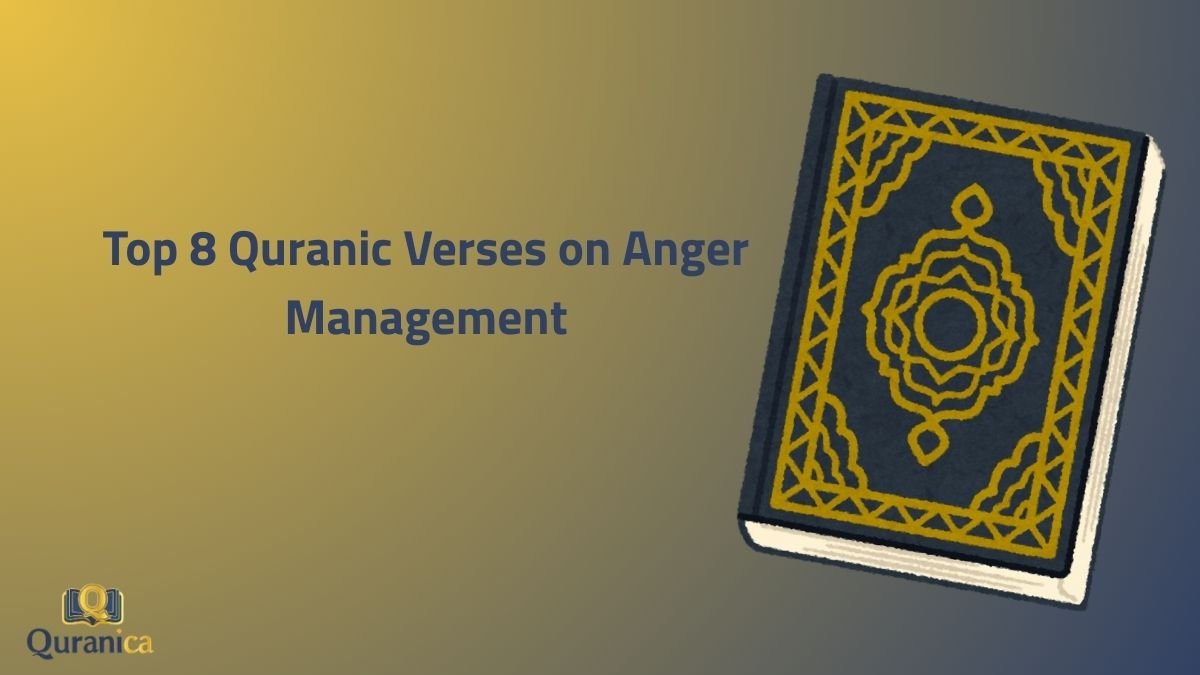The Quran offers powerful tools for anger management, urging believers to stay calm, forgive, speak kindly, and walk away from provocation with dignity. It links self-restraint to righteousness, warns against Shaytan’s whispers, and highlights patience as the path to lasting success. These divine reminders teach that true strength lies not in reacting, but in rising above.
We all encounter moments where anger threatens to overwhelm us. The Arabic root غضب (ghadab) captures that sudden surge within us.
But SubhanAllah, our Creator, in His infinite wisdom and mercy, did not leave us adrift. Throughout the Quran, qualities like sabr (patience) and hilm (forbearance, clemency) are praised – virtues deeply connected to keeping our anger in check.
Let’s explore together some Quranic quotes on anger management that offer direct guidance on this challenge.
1. A Quran Quote on Restraining Anger
Allah (SWT) describes the qualities of the righteous, those who strive for Jannah (Paradise), and among their key characteristics is the ability to manage their anger.
Think about this placement – controlling anger is mentioned alongside spending in charity and forgiving others, highlighting its immense importance.
“الَّذِينَ يُنفِقُونَ فِي السَّرَّاءِ وَالضَّرَّاءِ وَالْكَاظِمِينَ الْغَيْظَ وَالْعَافِينَ عَنِ النَّاسِ ۗ وَاللَّهُ يُحِبُّ الْمُحْسِنِينَ”
“Alladheena yunfiqoona fis-sarraaa’i wad-darraaa’i wal kaadhimeenal ghaidha wal ‘aafeena ‘anin-naas; wallaahu yuhibbul muhsineen.”
“Who spend [in the cause of Allah] during ease and hardship and who restrain anger and who pardon the people – and Allah loves the doers of good” (Al-Imran 3:134).
Pay close attention to the beautiful Arabic phrase “الْكَاظِمِينَ الْغَيْظَ” (al-kaadhimeen al-ghayz). The word kaadhimeen comes from a root meaning to swallow, restrain, or hold back completely, like closing the top of a full water skin so nothing spills out.
Really gives you a good visual – not just suppressing anger outwardly, but truly containing and managing that intense inner feeling.
It requires strength and conscious effort. Allah doesn’t just say “those who don’t get angry,” but “those who restrain their rage.” This acknowledges the feeling exists but praises the conscious choice to control it for His sake.
And the reward? Being counted among the Muhsinun, those whom Allah loves! What greater motivation could there be?
2. A Quranic Verse About Controlling Anger Through Forgiveness
Allah describes another quality of the believers, linking the avoidance of major sins with the ability to forgive even when angered. This connection is profound – controlling anger is tied to spiritual purity and the strength to pardon.
“وَالَّذِينَ يَجْتَنِبُونَ كَبَائِرَ الْإِثْمِ وَالْفَوَاحِشَ وَإِذَا مَا غَضِبُوا هُمْ يَغْفِرُونَ”
“Walladheena yajtaniboona kabaaa’iral ismi walfawaaḥisha wa ‘idhaa maa ghadiboo hum yaghfiroon”.
“And those who avoid the major sins and immoralities, and when they are angry, they forgive”. (Ash-Shuraa 42:37)
Notice the sequence here: “وَإِذَا مَا غَضِبُوا هُمْ يَغْفِرُونَ” (wa ‘idha maa ghadiboo hum yaghfiroon) – “and when they are angry, they forgive.” Allah acknowledges that believers will experience anger (ghadab); it’s a natural human response. The test, the mark of true faith (iman), lies in what follows.
Instead of letting anger lead to harsh words, resentment, or revenge, the believer chooses the higher path: forgiveness.
This isn’t weakness; it’s immense strength, a conscious decision to emulate Allah’s own quality of forgiveness (Al-Ghafoor).
For those wishing to deepen their understanding of the Quran’s language and meaning, Quranica’s Quranic Arabic or Online Quran Tafseer Course provide structured paths guided by experienced teachers like myself.
3. A Quranic Verse on Dealing with Anger’s Source
Allah explicitly tells us where the whispers that fuel destructive anger often come from – Shaytan (Satan). He then provides the direct antidote: seeking refuge in Allah.
“وَإِمَّا يَنزَغَنَّكَ مِنَ الشَّيْطَانِ نَزْغٌ فَاسْتَعِذْ بِاللَّهِ ۖ إِنَّهُ هُوَ السَّمِيعُ الْعَلِيمُ”
“Wa ‘immaa yanzaghannaka minash Shaitaani nazghun fasta’idh billaah; innahoo Huwas Samee’ul ‘Aleem.”
“And if an evil suggestion comes to you from Satan, then seek refuge in Allah. Indeed, He is the Hearing, the Knowing.” (Fussilat 41:36)
Abd al-Rahman ibn Zayd reported: When the verse, ‘Hold to forgiveness…’ [Al-A’raf 7:199] was revealed, the Prophet (peace and blessings be upon him) asked, ‘O Lord, how [should this be applied] regarding anger?’ (Or: ‘…what about [when dealing with] anger?’). In response, the verse was revealed: ‘And if an evil suggestion comes to you from Satan, then seek refuge in Allah.’
The word “يَنزَغَنَّكَ” (yanzaghannaka) implies a prodding, a goading, or an incitement – exactly how Shaytan works, subtly pushing us towards losing control when angered.
The immediate command “فَاسْتَعِذْ بِاللَّهِ” (fasta’idh billaah) – “then seek refuge in Allah” – is our weapon. It’s a direct call to action. The moment you feel that negative urge, that whisper telling you to escalate, immediately turn to Allah.
Read more about: Quranic Verses: 20 Beautiful And Powerful Quranic Quotes in Arabic and English
4. A Quranic Quote on Responding with Peace to Manage Anger
Allah (SWT) describes His true servants (‘Ibad-ur-Rahman), highlighting their humility and their peaceful response when confronted by ignorance or provocation – situations that often ignite anger.
“وَعِبَادُ الرَّحْمَٰنِ الَّذِينَ يَمْشُونَ عَلَى الْأَرْضِ هَوْنًا وَإِذَا خَاطَبَهُمُ الْجَاهِلُونَ قَالُوا سَلَامًا”
Wa ‘ibaadur Rahmaanil ladheena yamshoona ‘alal ardi hawnanw wa ‘idhaa khaatabahumul jaahiloona qaaloo salaamaa.
“And the servants of the Most Merciful are those who walk upon the earth easily, and when the ignorant address them [harshly], they say [words of] peace,” (Al-Furqan 25:63)
The “ignorant” (jaahiloon) here often refers to those who speak foolishly, rudely, or provocatively.
How easy it is to let their words spark anger in us!
But the servants of Ar-Rahman (The Most Merciful) choose a different path. They respond with “سَلَامًا” (salaaman) – peace. This isn’t just uttering the word ‘salam’; it signifies disengagement from negativity, choosing peace over conflict, responding with composure and well-wishing rather than anger.
It’s a proactive step to extinguish the fire of anger before it spreads.
This requires immense self-control, a quality nurtured by a deep connection with Allah.
Read more about: Quranic Verses on Life (Arabic & English Quotes)
5. A Quran Quote on Avoiding Angry Speech
Anger often loosens the tongue, leading to words we later regret, words that can sever ties and deepen wounds. The Quran explicitly warns us about the potential for discord sown by ill-chosen words, urging us to always choose the best manner of speaking.
“وَقُل لِّعِبَادِي يَقُولُوا الَّتِي هِيَ أَحْسَنُ ۚ إِنَّ الشَّيْطَانَ يَنزَغُ بَيْنَهُمْ ۚ إِنَّ الشَّيْطَانَ كَانَ لِلْإِنسَانِ عَدُوًّا مُّبِينًا”
(Wa qul li’ibaadee yaqoolul-latee hiya ahsan; innash-shaytaana yanzaghu baynahum; innash-shaytaana kaana lil-insaani ‘aduwwam mubeenaa)
“And tell My servants to say that which is best. Indeed, Satan induces [discord] among them. Indeed Satan is ever, to mankind, a clear enemy.” (Al-Isra 17:53)
Allah commands the Prophet (peace be upon him), and through him, all of us, to tell His servants yaqoolul-latee hiya ahsan – to speak that which is best, most excellent, most kind.
Why? Because innash-shaytaana yanzaghu baynahum – Shaytan actively tries to sow discord and enmity between people, often using harsh words spoken in anger as his tool.
This verse is direct Islamic guidance for anger management: guard your tongue. Before speaking in anger, pause. Ask yourself: Is what I am about to say ahsan? Is it the best way? Or will it pour fuel on the fire?
Choosing kinder, wiser words, even when upset, closes the door on Shaytan’s mischief. Even reciting such verses with proper Tajweed helps instill their meaning – the gravity of the command, the warning about Shaytan, resonates more deeply when the words flow correctly.
6. A Quranic Verse Promising a Good Outcome on Patience
Often, when we feel angry, we want immediate results or resolution. But Allah teaches us the virtue of patience, reminding us that the ultimate success belongs to those who practice it with piety. After recounting the long, patient struggle of Prophet Nuh (Noah, peace be upon him) with his people, Allah gives this comforting instruction:
“…فَاصْبِرْ ۖ إِنَّ الْعَاقِبَةَ لِلْمُتَّقِينَ”
(…Fasbir; innal-‘aaqibata lil-muttaqeen)
“…So be patient. Indeed, the [best] outcome is for the righteous.” (Surah Hud 11:49)
When you face situations that provoke anger, remember this divine instruction. Practice Sabr. Why? Because innal-‘aaqibata lil-muttaqeen – the best end, the successful result, the ultimate victory belongs to those who have Taqwa (righteousness, God-consciousness), and patience is a cornerstone of Taqwa.
Holding back your anger, choosing a patient response instead of a hasty one, leads to a better outcome, whether it’s preserving a relationship, avoiding regret, or gaining reward from Allah. Reflecting on the stories of the Prophets in the Quran truly deepens our understanding and appreciation of virtues like patience.
7. Quranic Quote on Avoiding Provoking Situations
Sometimes the wisest way to manage anger is to avoid the situations that ignite it in the first place. The Quran describes the true servants of Allah (‘Ibad-ur-Rahman) with qualities we should aspire to, including how they deal with negativity and provocation.
“وَالَّذِينَ لَا يَشْهَدُونَ الزُّورَ وَإِذَا مَرُّوا بِاللَّغْوِ مَرُّوا كِرَامًا”
(Wallatheena laa yash-hadoonaz-zoora wa idhaa marroo bil-laghwi marroo kiraamaa)
“And [they are] those who do not testify to falsehood, and when they pass near ill speech, they pass by with dignity.” (Al-Furqan 25:72)
Laghw refers to ill speech, vain talk, nonsense, foolishness – things that often stir up trouble or anger.
What do these exemplary believers do when they encounter such things? They don’t stop to engage, argue, or get drawn in. They marroo kiraamaa – they pass by with kiraam, meaning dignity, honour, nobility. They rise above it.
This is a profound lesson in preventative anger management. If you know certain gatherings, conversations, or online interactions are filled with laghw that easily provokes you, the dignified response is often to simply pass by, physically or metaphorically.
Let Quranica Help You in Your Quranic Path
Here at Quranica, we are blessed with dedicated native Arab teachers, many of whom are graduates of the esteemed Al-Azhar University in Egypt. We bring years, often decades, of experience teaching the Quran, Arabic, and Islamic Studies specifically to non-Arab students like yourselves. Many of our teachers hold Ijazah, the traditional certification granting authority to teach Quran recitation and memorization, ensuring you receive authentic and high-quality instruction.
Consider starting with:
- Online Quran Recitation Course: Build fluency and confidence in reading the Quran beautifully.
- Learn Quran with Tajweed: Perfect your recitation from beginner to advanced levels, with specialized classes for sisters available.
- Online Quran Memorization (Hifz) Classes: Tailored programs for kids, adults, and dedicated classes for sisters.
- Tafsir & Reflection Sessions – Understand the deeper meanings of verses like these.
Explore our courses at Quranica today and
Sign up for a trial class TODAY.

Conclusion:
The Quran offers profound guidance on anger management, emphasizing inner restraint, forgiveness, and composure. Believers are praised for holding back their anger, forgiving others even when provoked, and responding to hostility with peace. These virtues—sabr (patience), hilm (gentleness), and taqwa (God-consciousness)—are repeatedly linked with righteousness and divine reward. Verses highlight that anger is natural, but choosing control over reaction is what earns Allah’s love and places one among the righteous.
The Quran teaches us to recognize Shaytan’s role in provoking anger and urges seeking refuge in Allah as the first response. It encourages dignified silence over engaging with vain speech, and reminds us that the best outcomes are for those who remain patient. At Quranica, these lessons are brought to life through courses in Tajweed, recitation, and Tafsir—helping students internalize Quranic values and apply them in real-life situations with clarity and wisdom.








0 Comments